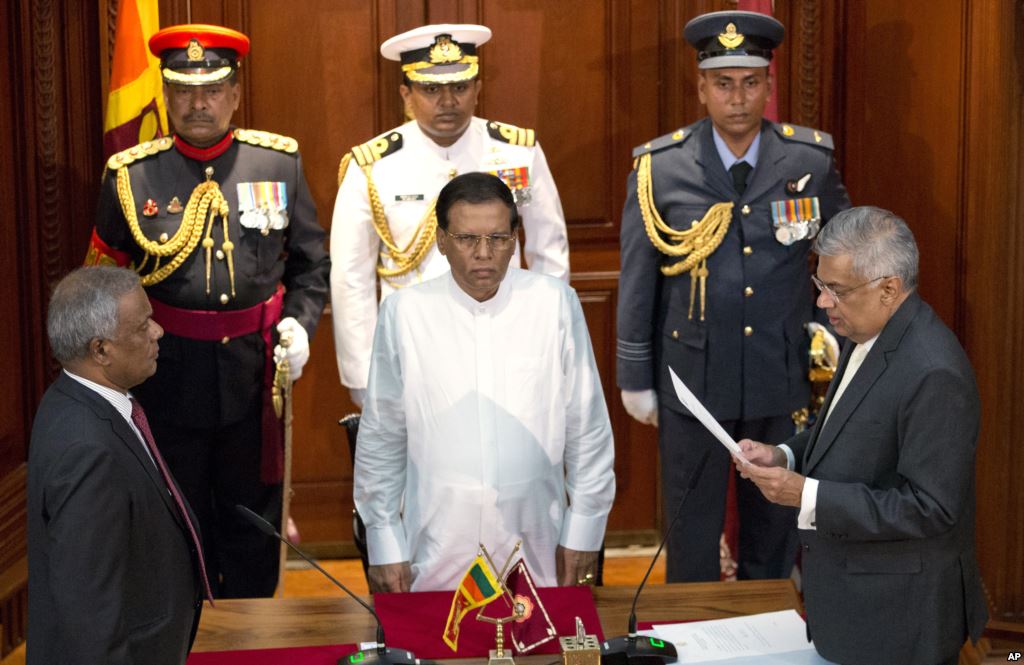-
Tips for becoming a good boxer - November 6, 2020
-
7 expert tips for making your hens night a memorable one - November 6, 2020
-
5 reasons to host your Christmas party on a cruise boat - November 6, 2020
-
What to do when you’re charged with a crime - November 6, 2020
-
Should you get one or multiple dogs? Here’s all you need to know - November 3, 2020
-
A Guide: How to Build Your Very Own Magic Mirror - February 14, 2019
-
Our Top Inspirational Baseball Stars - November 24, 2018
-
Five Tech Tools That Will Help You Turn Your Blog into a Business - November 24, 2018
-
How to Indulge on Vacation without Expanding Your Waist - November 9, 2018
-
5 Strategies for Businesses to Appeal to Today’s Increasingly Mobile-Crazed Customers - November 9, 2018
Current Affairs 2015 : New Prime Minister of Sri Lanka takes oath
Sri Lanka’s United National Front (UNF) leader Ranil Wickremesinghe (1st R) takes oath as the nation’s new prime minister before President Maithripala Sirisena (C) at a special ceremony held at the Presidential Secretariat in Colombo, capital of Sri Lanka, on August. 21, 2015.
Advertisement
A day after the 66-year-old incumbent premier thwarted ex-president Mahinda Rajapaksa’s bid to stage a political comeback amid a surge in support for his reform-driven mandate, Wickremesinghe struck a reconciliatory note and called all parties to contribute to nation-building.
Wickremsinghe, a lawmaker since 1977, has already served three times as prime minister, a position second to the president.
Sirisena broke away from Rajapaksa’s government a year ago and won the January 8 presidential election with support from Wickremesinghe, who was opposition leader at the time.
The UNP won 106 seats, seven short of a majority in the 225-member Parliament.
‘I think the present balance of power offers an unprecedented opportunity for the formation of a national government which would be both stable and acceptable to the large majority of the electorate, ‘ Gunetilleke commented.
The Commonwealth observer group said the election was “credible, met the key criteria for democratic elections and the outcome reflected the will of the people of Sri Lanka“. As the new Sri Lankan government implements reforms and makes efforts toward ethnic reconciliation, the U.S. should consider on a priority basis Sri Lanka’s eligibility as an MCC recipient. Don’t you think, if a set of SLFPers join the national government, and another set remain in the opposition, it will again be a confused state?
“If the president is saying he is not going to name your guy prime minister, why would you go out and vote?” said one Western diplomat.
Underlining the real goal of the coalition, SLFP secretary Dissanayake said: “The President [Sirisena] emphasised that a national unity government was necessary at this juncture to overcome worldwide and economic challenges facing the country”. It may be recalled that he did not appoint even his trusted lieutenant, Vajira Abeywardene, who lost the 2010 general election, to Parliament through the NL, in spite of pressure from the party and his loyalists. The SLFP won 95 seats in the vote, a substantial fall from 144 before the ballot.
Regrettably, moves are reportedly being made to appoint some of the defeated UPFA candidates in the good books of President Maithripala Sirisena to Parliament through the NL.
The two parties have a history of bitter rivalry.
Amid rising social tensions, the Jayawardene government whipped up divisive anti-Tamil communalism, culminating in the 1983 island-wide pogroms against Tamils that triggered the country’s protracted civil war and the loss of hundreds of thousands of lives.
The Prime Minister was responding to a question raised by a foreign journalist while having a chat after the Prime Minister met the media briefly last week after winning the Parliamentary election.
Wickremesinghe on Wednesday appealed to all political parties to work together.
Advertisement
The deal is a remarkable turnaround for a country that appeared firmly in Rajapakse’s grip until his surprise defeat in January’s presidential polls.





























